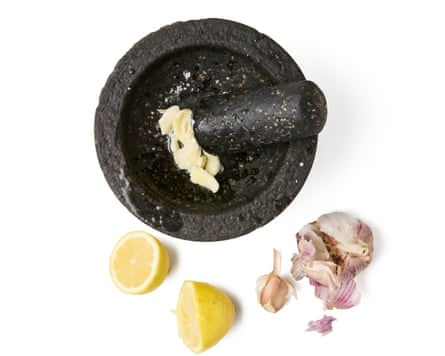A Portuguese dish with its roots firmly in the former colonies of Angola and Mozambique, this fiery, tangy marinade was popularised in Britain by a South African chain and has quickly gone native. These days, you can get piri piri salad dressing, piri piri crisps and even piri piri fish and chips, but you can’t beat the original, fresh from the grill.
Prep 10 min
Marinate 1 hr+
Cook 1 hr
Serves 4
4 skin-on, bone-in whole chicken legs (ie, thigh and drumstick)
Lemon wedges, to serve
For the marinade
4 garlic cloves
2 tsp flaky salt
Juice of ½ lemon
For the piri piri sauce
2-4 red African or Thai bird’s eye chillies, to taste
2 plump garlic cloves
1½ tsp flaky salt
Juice of 1 lemon
2 tsp sweet smoked paprika
50ml olive oil, or neutral oil
1 tbsp port, or 1 tsp brown sugar (optional)
1 Chicken leg or breast?
Traditionally, this would be made with a whole spatchcocked chicken, but I found it hard to source birds small enough to cook through without burning (you could use a guinea fowl instead, if you prefer). Also, because breasts dry out quickly over a high heat, I generally stick with just chicken legs, so swap in breasts or wings if you like.

2 Or other meat?
Alternatively, use the same marinade on whole fish (sardines, sea bream, mackerel, etc) or meaty fish fillets (chef Nuno Mendes pairs it with halibut), large prawns, lamb or pork chops, or firm tofu. I’d suggest lightly brushing vegetables with oil and salt before cooking, rather than with the marinade, and serving with the latter as a sauce.
3 Prepare the chicken
If using the chicken legs, buy them bone in for ease of cooking; leave the skin on, too, to insulate them against the heat. If you’d prefer them broken down into drumsticks and thighs, by all means do so, or buy them separately. Either way, put the chicken in a tub or roasting tin just large enough to hold it all in a single layer.

4 Marinate in lemon and garlic
Peel the garlic and puree with a garlic crusher, pestle and mortar or the flat of a knife. Mix in the salt and lemon juice, then pour over the meat, turning to ensure it’s well coated. Cover and leave at room temperature (unless it’s a very hot day) for an hour, or chill for up to four hours.
5 A note on the chillies

Meanwhile, make the sauce. Fresh piri piri chillies are hard to come by in the UK, though they’re sometimes available online, but any fiery ripe (red) variety will do, and I think fresh work better than dried. Exercising caution, or wearing gloves, roughly chop the flesh seeds and all, discarding the stalks.
6 Finish the sauce

Peel and roughly chop the garlic, then use a pestle and mortar, the back of a heavy knife or a mini chopper to mash together with the chillies and salt. Stir in the lemon juice, then whisk in the paprika and oil. Taste gingerly and add the port, if using, or sugar if you’d like it to be sweeter.
7 Grill the chicken …

Prepare the barbecue, if using. Once it’s at cooking temperature (if using a coal barbecue, wait until the coals turn grey), arrange the chicken on a lightly greased grill and cover. Cook for 35 minutes, turning once, then check. Once it’s almost done, brush with the piri piri sauce and grill, lid off, for about another 10 minutes, until cooked through.

8 … or roast
Alternatively, heat the oven to 200C (180C fan)/390F/gas 6 and bake the chicken in a roasting tin or tray for about 35 minutes, until cooked through, basting with its juices occasionally. Heat a griddle pan to medium hot, brush the chicken with the piri piri and grill for a few minutes on each side, until just starting to char.
9 Serving suggestions
Serve the chicken with chips, rice or bread and tomato salad, with extra lemon wedges and any remaining sauce on the side. Note that it’s worth making double the sauce, because in Portugal it’s served with all sorts and not just chicken – you can also buy good ready-made versions in Portuguese or some African specialists.

 3 months ago
48
3 months ago
48

















































